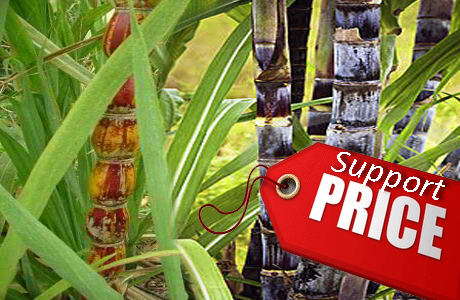Dispute over cane support price
By: Mohammad Hussain Khan
 THE
commencement of the sugarcane crushing season has been
unduly delayed this year, leaving growers high and dry.
THE
commencement of the sugarcane crushing season has been
unduly delayed this year, leaving growers high and dry.
Sindh-based sugar millers have challenged the provincial
government’s authority to fix the sugarcane price.
So far only two sugar mills — Matiari and Sanghar — have
started crushing. Some factories have only fired up their
boilers so far.
The Sindh government fixed the sugar- cane price at Rs182
— up Rs2 from Punjab’s cane price — against farmers’ demand
of Rs210 per 40kg. The price was fixed as late as on
November 7.
At 18.531m tonnes, cane production exceeds the official
target of 17m tonnes for this season. The yield has
increased by 3pc per hectare to 58.5 tonnes, against the
earlier estimate of 56.7 tonnes.
The current crop has fully matured for harvesting. Lodging
is being reported in areas where varieties of short duration
were grown.
While the crop is losing weight — resulting in monetary loss
for farmers — it is beneficial for millers, as, in such
cases, the recovery of sucrose content increases.
Every year, the delay in crushing has been a bone of
contention between farmers and millers. The delay puts the
growers in a difficult position.
Cultivators either sell their crop at whatever rate is being
offered, or keep the crop intact in the fields as long as
possible by providing water, which is actually meant for
wheat.
The Pakistan Sugar Mills
Association (PSMA), Sindh, argues that while the provincial
government fixes the cane price, it leaves the price of the
end-product (sugar) to the vagaries of the free market.
Cane production in Sindh, at 1.85m tonnes, exceeds the
official target of 17m tonnes. The yield increased by 3pc
per hectare to 58.5 tonnes, against the estimated 56.7
tonnes.
The current crop has fully
matured for harvesting.
According to PSMA Sindh
chairman Ahmed Bawani, it is easier for millers to import
sugar under present conditions, instead of crushing the crop
to pay the price fixed by government.
He believes that the government is forcing them to purchase
cane at the official rate, which is difficult for them.
He says full-scale export of
sugar is not allowed and the price of sugar stands at Rs42
per kg. With this price scenario, how can millers pay Rs182
to cane producers, he asks.
Sindh Abadgar Board vice
president Mahmood Nawaz Shah and Sindh Chamber of
Agriculture’s (SCA) Nabi Bux Sathio were surprised that the
millers were objecting to the fixing of the cane price.
They contend that the millers
ignore the fact that they get multiple by-products like
bagasse, ethanol and molasses out of sugarcane.
“Figures also prove that the recovery of sucrose content is
more than Sindh’s benchmark of 8.7pc, but the growers don’t
get paid for the quality premium on every 1pc of recovery as
the millers obtained a stay order against it a decade back,”
argues Shah.
He says the sucrose recovery
usually varies between 9-10.5pc in Sindh, and sometimes even
goes up to 11pc.
The cost of farmers’ inputs — including urea and DAP
fertiliser, diesel and pesticides etc — has increased
manifold over the last several years, Sathio says.
Growers spend Rs142,000 per acre on various heads, and even
if they get a yield of 600 maunds per acre (although the
national average is 560 maunds), they would get Rs100,000
per acre if the price is Rs182. “
Punjab’s mills have started
crushing and the PSMA Punjab chapter has not filed a
petition there,” he says.
Sindh has around 37 sugar mills, two of which are unlikely
to start cane-crushing this season.
The number of sugar mills in
has recently increased in the province, and some of them
have reportedly raised their crushing capacity. Such
factories are mostly located on the left bank of the Indus,
where the availability of water is relatively better.
Farmers note that the increase in the number of sugar mills,
particularly in areas otherwise known for cultivating the
cotton crop, indicates the profit margins offered by the
sugar business.
They reject the PSMA’s
argument that the mills are not able to meet their cost of
production.
However, the millers argue that prices of commodities like
basmati and fresh milk have risen by 285pc during 2000-2001
to 2012-2013. In comparison, the price of sugar has
increased by 92pc.
But growers’ representatives hint at an alliance between the
government and the millers.
They recall that the meeting
to fix the cane price between millers, farmers and the
agriculture minister was held on October 26, but the
agriculture department withheld the issuance of the
notification. By that time, the millers had already moved
the high court.
December, 2014
Source: Dawn
News